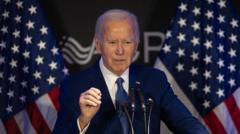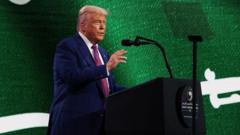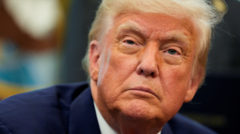In a significant diplomatic event, President Trump met with Syrian President Ahmed al-Shara during a summit in Saudi Arabia, where he announced the lifting of U.S. sanctions against Syria. This meeting, the first between U.S. and Syrian leaders in 25 years, indicates a potential thawing of relations as al-Shara aims to reintegrate Syria into the international community.
Historic Summit: Trump Meets Syria's Ahmed al-Shara in Saudi Arabia, Lifts Sanctions

Historic Summit: Trump Meets Syria's Ahmed al-Shara in Saudi Arabia, Lifts Sanctions
President Trump's meeting with newly appointed Syrian President Ahmed al-Shara signals a major shift in U.S. foreign policy towards Syria, marking the end of decades of diplomatic isolation.
In a historic meeting in Riyadh, President Donald Trump convened with Ahmed al-Shara, the newly appointed President of Syria, marking the first direct dialogue between the top leaders of the two countries in 25 years. This unprecedented encounter coincided with Trump's announcement to lifted longstanding U.S. sanctions, signaling a pivotal shift in American foreign policy towards Syria.
During the meeting—invited by Crown Prince Mohammed bin Salman and attended via phone call by Turkish President Recep Tayyip Erdogan—Trump and al-Shara discussed potential normalization of ties, with Trump emphasizing the chance for al-Shara to effect historic changes within Syria. Al-Shara, a former rebel leader who initially led an Al Qaeda faction, garnered international scrutiny during his rise but is now focusing on stabilizing Syria's economy to escape the severe impact of restrictions.
This significant diplomatic exchange is part of Trump's broader Middle East tour, engaging Gulf states to explore business ventures while addressing geopolitical tensions. Trump's rapport with regional leaders, particularly in Saudi Arabia and Turkey, played an essential role in facilitating the meeting and the call for lifting sanctions—a viewpoint welcomed by the regional leadership, which considers Syria's recovery crucial to Middle Eastern stability.
The Syrian government characterized the meeting as a "historic" moment, while the Saudi foreign minister emphasized the untapped potential of Syria's resources and population. Al-Shara's administration has already begun addressing various international concerns, aiming to accelerate the removal of sanctions that have plagued their economy since the civil war began.
Overall, this summit represents a dramatic turnaround for Syria, echoing a potential normalization of relationships, while raising questions about the future of U.S. engagement in the region amid ongoing conflicts, particularly in Gaza. The implications of such diplomatic maneuvers are significant, potentially reshaping the future of Syrian relations with the international community while impacting regional dynamics.
During the meeting—invited by Crown Prince Mohammed bin Salman and attended via phone call by Turkish President Recep Tayyip Erdogan—Trump and al-Shara discussed potential normalization of ties, with Trump emphasizing the chance for al-Shara to effect historic changes within Syria. Al-Shara, a former rebel leader who initially led an Al Qaeda faction, garnered international scrutiny during his rise but is now focusing on stabilizing Syria's economy to escape the severe impact of restrictions.
This significant diplomatic exchange is part of Trump's broader Middle East tour, engaging Gulf states to explore business ventures while addressing geopolitical tensions. Trump's rapport with regional leaders, particularly in Saudi Arabia and Turkey, played an essential role in facilitating the meeting and the call for lifting sanctions—a viewpoint welcomed by the regional leadership, which considers Syria's recovery crucial to Middle Eastern stability.
The Syrian government characterized the meeting as a "historic" moment, while the Saudi foreign minister emphasized the untapped potential of Syria's resources and population. Al-Shara's administration has already begun addressing various international concerns, aiming to accelerate the removal of sanctions that have plagued their economy since the civil war began.
Overall, this summit represents a dramatic turnaround for Syria, echoing a potential normalization of relationships, while raising questions about the future of U.S. engagement in the region amid ongoing conflicts, particularly in Gaza. The implications of such diplomatic maneuvers are significant, potentially reshaping the future of Syrian relations with the international community while impacting regional dynamics.






















